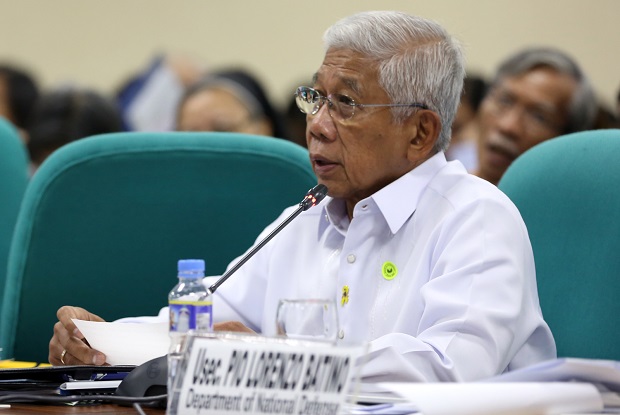‘Limited martial law’ best solution vs Abus–Gazmin
Troops should be granted “emergency powers” to effectively eradicate the Abu Sayyaf group, which is currently holding a number of foreign hostages, outgoing Defense Secretary Voltaire Gazmin said on Wednesday.
Speaking at his last sit-down interview in Camp Aguinaldo, Gazmin stressed that imposing limited martial law was the best solution to crush the Abu Sayyaf, a small gang of self-styled militants wanted for a spate of kidnappings and other atrocities in the country.
“The best solution here is what they call ‘emergency powers,’” Gazmin told reporters. “Probably we can be allowed to search the houses even without search warrants. You control the movement of people, you control the movement of food supplies. It’s like martial law, but [only with] limited power for just a limited time.”
His statement follows President Aquino’s recent admission that he had thought of declaring martial law in Sulu province, weeks before the June 13 ransom deadline the Abu Sayyaf group set for abducted Canadian national Robert Hall. Hall was eventually executed by the Abu Sayyaf, two months after the execution of fellow Canadian victim John Ridsdel.
7 new captives
Article continues after this advertisementThe two were abducted in September along with Norwegian Kjartan Sekkingstad and Filipino Marites Flor. Flor was recently released but Sekkingstad remains in captivity, and his health is said to be failing. The Abu Sayyaf is also believed to be holding captive seven Indonesians they seized last week off Sulu.
Article continues after this advertisementGazmin confirmed talks were ongoing to allow Indonesian troops to escort vessels sailing into Philippine waters to prevent similar attacks in the future. He said Malaysia was also involved in the discussions.
However, he clarified that foreign troops would not be allowed to help in rescue operations in Philippine territories, without prior coordination with Manila or if not in pursuit operations across borders.
‘They can’t just come in’
“For this particular incident, they can’t just come in. We can ask for help in terms of exchange of information… but for for them to come and help in the rescue, that’s not allowed,” Gazmin said.
Gazmin also discouraged governments from paying ransom, because the money fuels the trade all the more. He said a group is paid by the Abu Sayyaf to act as “spotters” for possible victims. Once seized, the victims are then taken to a shelter where another group negotiates ransom.
“We need to solve this. It’s a big issue that destroys our image in the international community. And they [other countries] need to be part of the arrangements because they are also victimized,” Gazmin said.
